
Kathleen Cagney, Professor of Sociology and Director of the Population Research Center at the University of Chicago, will discuss the Chicago Health and Activity Space in Real Time (CHART) study on a webinar on June 8th at 12pm EST. The CHART study uses new technology to address fundamental questions in urban sociology and in life course studies of older adult health. CHART employs innovative smartphone-based methods for the identification of older adults’ activity spaces (i.e., locations of routine activities in daily life). Analyses of 450 adults from ten Chicago neighborhoods who carried smartphones for GPS tracking and ecological momentary assessments (i.e., short phone-based surveys) assess how the span, characteristics, and experiences of activity spaces vary across socioeconomic status and racial/ethnic groups. These data are then linked to Chicago-based sensor data, Array of Things, that characterize factors such as air quality. A central goal of this research program is to describe the social and spatial environments in which older adults spend their time and how activity space influences social connectedness and health, and may be an unexplored source of inequalities in health. Application of this approach to assessing COVID-19 vulnerability will be described.
Please RSVP here to receive a link to the webinar. We will email the link to the webinar the week of the event.
Dr. Kathleen Cagney (Ph.D. 1998 Johns Hopkins University) is Director of Population Research Center, NORC & University of Chicago. Professor Cagney’s work examines social inequality and its relationship to health with a focus on neighborhood, race, and aging and the life course. She has developed a series of papers on neighborhood social capital and its relationship to outcomes such as self-rated health, asthma prevalence, physical activity, and mortality during the 1995 Chicago heat wave. She also focuses on the validity of such measures and the development of new neighborhood-based metrics that reflect the perceptions and experiences of older residents. Currently she works on two Chicago-based studies of neighborhood context and older adult health, and is examining the role of the social and physical environment in older adult well-being with the National Social Life, Health, and Aging Project.
This event is sponsored by Johns Hopkins 21st Century Cities Initiative and the Hopkins Population Center.

